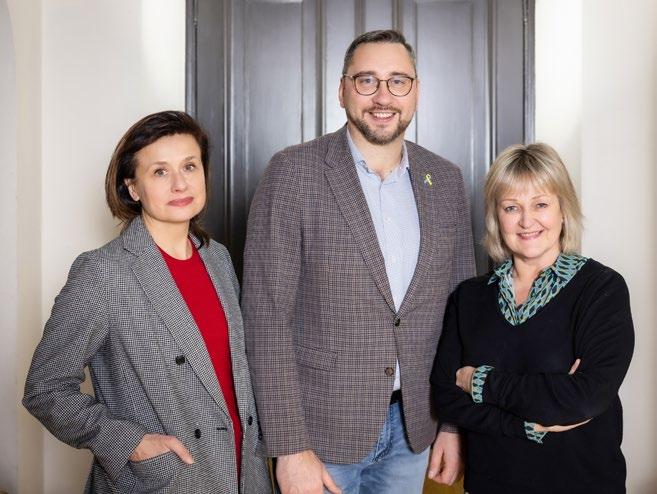
2 minute read
FOREWORD The Baltic States in Focus at 2023 EFM
The centenary of Estonian, Latvian, and Lithuanian independence in 2018 marked a new chapter for the film industry in each country - this anniversary helped make Baltic films more popular locally and increased their visibility around the world. The Baltics are valuable and reliable partners, and the industry is growing across the region.
Itis 111 years since the screening of the very first Estonian film in the cinema. Estonia values its world class filmmakers very highly and has a rich variety of films and international awards under its belt. Estonians have kept their filmmaking alive through many challenging times. Today, with the local market share of admissions at 20,8%, the Estonian film industry is riding high, and audiences very much appreciate what they see.
In this special edition of our magazine, we have put a focus on director Anna Hints’ latest documentary Smoke Sauna Sisterhood that premiered at Sundance in January, and a rather daring interview shines a light into the intriguing topics of the film.
2023 will be also an especially great year for Estonian animation. Sander Joon’s Sierra is shortlisted for the Oscar race. The Estonian-Croatian co-production Eva, directed by Morten Tšinakov and Lucija Mrzljak is in the Short Film Competition in Berlin. The Company Matching programme at the EFM co-production market includes an Estonian company Amrion, run by producer Riina Sildos. She also has a co-production animation in the competition in the Berlinale Generation Kplus Programme - A Greyhound of a Girl – and one of the co-producers is also from Latvia.
The history of Latvian cinema stretches back to the early 20th century. It was only a little over 30 years ago, however, that Latvian cinema could rejoin the Europe film industry from which it had been separated for half a century by the Soviet occupation. The film history of Latvia includes personalities like radical avant-garde filmmaker Sergei Eisenstein, whose talent was nurtured in the multicultural Riga of the early 20th century.
The 1960s, on the other hand, saw the birth of a strong documentary film movement influenced by European modernism that has since become emblematic of Latvian cinema. Since regaining independence in the early 1990s, Latvia has established its global competitiveness and can rightfully be considered a country with a strong tradition of animation and documentary filmmaking.
There are currently five animated feature films in production, which is a significant number for a country of 1.9 million people. Latvian narrative feature films are also securing increased visibility. A great example is January by Viesturs Kairišs, which won top prizes at the Tribeca, Rome, and Warsaw film festivals in 2022. In Berlin, Eastern Front by Vitaly Mansky and Yevhen Titarenko, will be premiered at the Encounters programme.
Over the course of its existence, Lithuanian cinema has explored new narratives while drawing on deep-rooted traditions. Documentary filmmaking has always been a strong part of Lithuanian cinema identity, epitomised by such names as the godfather of the avant-garde cinema Jonas Mekas, and the explorer of poetic time and humanity Audrius Stonys. This strong documentary trend is alive to this day as the new generation of documentarists push the boundaries to explore their worldview. And international audiences and juries are taking note of it too – we’re delighted to see Lithuanian cinema being recognised at such events as the Cannes Film Festival and the European Film Awards where the film Mariupolis 2 by the late Mantas Kvedaravicˇius won impressive awards. Recent Lithuanian features are recognised as well - Pilgrims by Laurynas Bareiša won the Best Film Award in the Venice Orizzonti Programme, and Slow by Marija Kavtaradze just had its world premiere at the Sundance Film Festival. It is hugely gratifying to see all our films getting attention internationally. The Baltic States being selected as focus countries at this year’s European Film Market is an immense opportunity to let the world see our countries as the unique, versatile, and individually authentic places they are. We’re thrilled to invite you all to discover the potential of the Baltics and our film industries. BF










